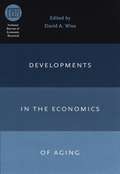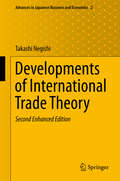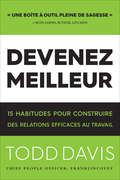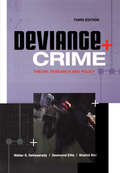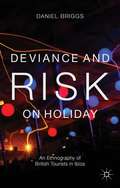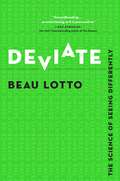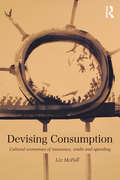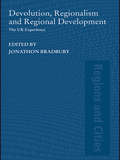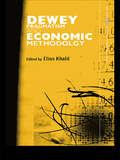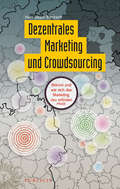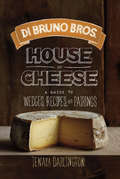- Table View
- List View
Developments in the Economics of Aging
by David A. WiseThe number of Americans eligible to receive Social Security benefits will increase from forty-five million to nearly eighty million in the next twenty years. Retirement systems must therefore adapt to meet the demands of the largest aging population in our nation's history. In Developments in the Economics of Aging, David A. Wise and a distinguished group of analysts examine the economic issues that will confront policy makers as they seek to design policies to protect the economic and physical health of these older Americans. The volume looks at such topics as factors influencing work and retirement decisions at older ages, changes in life satisfaction associated with retirement, and the shift in responsibility for managing retirement assets from professional money managers of traditional pension plans to individual account holders of 401(k)s. Developments in the Economics of Aging also addresses the complicated relationship between health and economic status, including why health behaviors vary across populations and how socioeconomic measures correlate with health outcomes.
Developments of International Trade Theory
by Takashi NegishiDevelopments of International Trade Theory offers the life-long reflections of a distinguished Japanese scholar who pioneered the application of general equilibrium theory to international trade. Written in a style that makes it easily accessible to scholars and students, the book combines standard topics on international trade with a discussion of the evolution of the theory and as well as recent discussions on topics such as immiserizing growth. This book consists of two parts. Part I examines the historical progression of international trade theory, and Part II addresses the modern theory and recent developments of international trade. In this way the book offers a comprehensive evaluation of the non-monetary problems of international economics. Taking advantage of the publication of this new edition, the author includes two new chapters, "Adam Smith and Disequilibrium Economic Theory" and "Complete Specialization in Classical Economics," which readers will profit from reading after they have studied the basic theories of international trade in the main part of the book.
Devenez Meilleur: 15 Habitudes Pour Construire Des Relations Efficaces Au Travail
by Todd Davis“Une bo?te à outil pleine de sagesse” de les experts en amélioration de la performance chez FranklinCovey (Seth Godin, auteur, Linchpin).Un guide practique pour tous ceux qui cerchent à créer un avantage concurrentiel dans n’importe quelle taille et type d’organisation en établissant des relations efficacies. Dans ce livre Todd Davis, Chief People Officer de FranklinCovey, explique que le meilleur atout d’une organisation n’est pas son personnel; ce sont plut?t les relations entre ses members qui prédisent le mieux l’efficacité personnelle. En fin de compte, la capacité des employés à établir et maintenir de bonnes relations est l’avantage concurrentiel ultime d’une organisation. Il identifie quinze pratiques éprouvées que les dirigeants influents à tous les niveaux d’une organisation utilisent pour s’approprier leur travail, améliorer la qualité des interactions avec les autres et ma?triser les compétences de relations efficacies.
Deviance and Crime: Theory, Research and Policy
by Shahid Alvi Walter S. Dekeseredy Desmond EllisThis book sensitizes the reader to the fact that there is substantial disagreement within the academic community, and among policymakers and the general public, over what behaviors, conditions (e.g., physical attributes), and people should be designated as deviant or criminal. Normative conceptions, the societal reaction/labeling approach, and the critical approach are offered as frameworks within which to study these definitions. A comprehensive explanation of theory and social policy on deviance is constructed.
Deviance and Risk on Holiday
by Daniel BriggsThis book represents the first attempt to step inside the holiday experience of young British tourists in San Antonio, Ibiza. Briggs' ethnographic study reveals the ugly truth about how and why they get involved in deviance and risk-taking when they go abroad, driven by self validation and a commodified social context.
Deviate: The Science of Seeing Differently
by Beau LottoBeau Lotto, the world-renowned neuroscientist, entrepreneur, and two-time TED speaker, takes us on a tour of how we perceive the world, and how disrupting it leads us to create and innovate. Perception is the foundation of human experience, but few of us understand why we see what we do, much less how. By revealing the startling truths about the brain and its perceptions, Beau Lotto shows that the next big innovation is not a new technology: it is a new way of seeing. In his first major book, Lotto draws on over two decades of pioneering research to explain that our brain didn't evolve to see the world accurately. It can't! Visually stunning, with entertaining illustrations and optical illusions throughout, and with clear and comprehensive explanations of the science behind how our perceptions operate, Deviate will revolutionize the way you see yourself, others and the world. With this new understanding of how the brain functions, Deviate is not just an illuminating account of the neuroscience of thought, behavior, and creativity: it is a call to action, enlisting readers in their own journey of self-discovery.
Devil Take the Hindmost: A History of Financial Speculation
by Edward ChancellorDescribes financial crises throughout history.
Devising Consumption: Cultural Economies of Insurance, Credit and Spending (CRESC)
by Liz McfallThe book explores the vital role played by the financial service industries in enabling the poor to consume over the last hundred and fifty years. Spending requires means, but these industries offered something else as well – they offered practical marketing devices that captured, captivated and enticed poor consumers. Consumption and consumer markets depend on such devices but their role has been poorly understood both in the social sciences and in business studies and marketing. While the analysis of consumption and markets has been carved up between academics and practitioners who have been interested in either their social and cultural life or their economic and commercial organisation, consumption continues to be driven by their combination. Devising consumption requires practical mixtures of commerce and art whether the product is an insurance policy or the next gadget in the internet of things . By making the case for a pragmatic understanding of how ordinary, everyday consumption is orchestrated, the book offers an alternative to orthodox approaches, which should appeal to interdisciplinary audiences interested in questions about how markets work and why it matters.
Devising a Clean Energy Strategy for Asian Cities
by Hooman FarzanehThis book capitalizes on two hot topics: the Low Carbon Emission Development Strategies and climate change in Asian cities. There is resurgence in making policies to investigate more aspects of the energy-environment spectrum for the global energy market in the future. This book helps the policy makers and researchers to understand which actions should be taken to reduce the environmental impacts of economic activities in different regions in Asia. The clean energy strategy proposed in this book refers to the development and implementation of policies and strategies that simultaneously contribute to addressing climate change and solving local environmental problems, which also have other development impacts. It provides insights to a wide audience on successful ways to promote, design and implement the clean energy policies in Asian cities. To determine the global actions, it is necessary to make breakthroughs by promoting further research and to present scenarios that achieve Low Emission Development Strategies (LEDS) goals without dependence upon fossil fuels. The scenarios and case studies discussed in this book are helpful to plan for the SDGs, where various objectives have to be achieved at the same time. The UN 2030 development agenda needs innovative planning to achieve multiple goals with limited resources and generate synergy among sectors. This book will be one of the first books available on this subject.
Devolution, Regionalism and Regional Development: The UK Experience (Regions and Cities)
by Jonathan BradburyDevolution, Regionalism and Regional Development provides an overview and critical perspective on the impact of devolution on regionalism in the UK since 1999, taking a research-based look at issues central to the development of regionalism: politics, governance and planning. This multidisciplinary book is written by academics from the fields of geography, economics, town planning, public policy, management, public administration, politics and sociology with a final chapter by Patrick Le Gales putting the research findings into a theoretical context. This will be an important book for those researching and studying economic and political geography and planning as well as those involved in regional development.
Devotions for Debtors
by Kristen Johnson IngramGetting out of debt, and staying out, is more than a financial formula—it’s a daily choice that you can make.Filled with one hundred and twenty devotions that will help you break the habits that lead to debt and Scriptural passages to meet the very real needs of this difficult journey, Devotions for Debtors is a handy, helpful guide to learning to live within your means. Meditations address such topics as gift-giving temptation, the joys of no-money fun, and how to ask God for help dealing with the rollercoaster of emotions debt can bring on. Each devotion also includes thoughts for further reflection and exercises that may inspire you to pursue wellness in other areas of your life as well.An inspired, practical guide to changing your life, Devotions for Debtors is here to help.
Dewar's (A): Brand Repositioning in the 1990s
by Alvin J. Silk Lisa R. KleinDewar's, a major brand of Scotch whisky, produced by United Distillers of the U.K., and the U.S. leader in the Scotch category with a 15% market share, faced a declining market among traditional consumers of distilled spirits. Given the growing societal, legal, and regulatory opposition to drinking in the U.S., the marketing options were limited. In addition, drinking preferences had shifted away from distilled spirits to lighter, lower alcohol beverages like wine, wine coolers, and beer. In early 1993, Dewar's U.S. importer, Schieffelin and Somerset, in cooperation with the brand's longstanding advertising agency, Leo Burnett, began to explore the opportunities for repositioning Dewar's to younger adults. Repositioning Dewar's was a necessity for the brand to remain viable in the long term. Its existing customer base was aging, and younger drinkers who did drink Scotch were consuming less. The issue is how to update the brand's image to attract younger consumers. The brand manager faces the decision of planning the strategy for a repositioning or "recruitment" campaign for the brand.
Dewey, Pragmatism and Economic Methodology
by Elias L. KhalilThis book brings together, for the first time, philosophers of pragmatism and economists interested in methodological questions. The main theoretical thrust of Dewey is to unite inquiry with behavior and this book's contributions assess this insight in the light of developments in modern American philosophy, social and legal theories, and the theor
Dezentrales Marketing und Crowdsourcing: Warum und wie sich das Marketing neu erfinden muss
by Hans-Jürgen BorchardtKlassisches Marketing ist nicht selten geprägt durch eine systembedingte Trägheit, unzureichende Beachtung der Kundenerwartungen, zentralistische Strukturen, wunschbasierte Planzahlen oder unzureichende Koordination mit internen Partnern. All dies führt dazu, dass Unternehmen nicht oder zumindest weniger erfolgreich sind, als sie es sein könnten. Marketing muss sich neu erfinden, wenn die Unternehmen eine Zukunft haben wollen. Eine Komponente ist das dezentrale Marketing, bei dem Entscheidungen und Initiativen denjenigen überlassen werden, die sich in der Nähe der Kunden befinden. Dazu gehören kurze Reaktionszeiten, kompetentes Nutzen von Social Networks, Übernahme von direkter Verantwortung durch diejenigen, die Marketingmaßnahmen praktizieren, kurze Entscheidungswege, Open Innovation und Crowdsourcing oder erweiterte Serviceorientierung. Hans-Jürgen Borchardt zeigt Unternehmen, welche Elemente des Marketing in den nächsten Jahren relevant sein werden und worauf Unternehmen achten müssen, wenn sie dauerhaft Erfolg haben wollen. Marketingabteilungen, Unternehmenseinheiten und Filialen, aber auch Klein- und mittelständische Unternehmer können ihre aktuellen Strategien, Strukturen und Prozesse daran spiegeln und Ideen für neue Konzepte gewinnen.
Dhamani Jewels: Becoming a Global Luxury Brand
by Lynda M. Applegate Lisa MazzantiDhamani started as a loose gemstone dealer in 1969 in Jaipur, India. By the 2000s, it was headquartered in Dubai, United Arab Emirates and had expanded into diamonds and retail. The family business was now in its second generation of leadership and aimed to become a top global jewelry brand within the next 10 years. The family had been successful throughout its various inflection points in the past-had it positioned itself well to soon begin competing with the global, high-end jewelry houses such as Cartier and Bulgari?
Dharavi: Developing Asia's Largest Slum (A)
by Namrata Arora John D. Macomber Lakshmi IyerMaharashtra state is accepting bids to redevelop Dharavi, the largest slum in Asia. A real estate developer assesses the risks and tenders a bid. The bid conditions include providing new free housing to tens of thousands of slum dwellers. The cost of constructing the housing is anticipated to be paid for from the revenues from developing and selling market-rate housing. While the primary concerns are cost of construction, cost of capital, and revenues from sale of units, the analysis must consider many aspects of risk, including political risk, foreign exchange risk, market risk, and execution risk. Further, the discussion covers social aspects, including whether the slum should be redeveloped at all, whether it should be redeveloped by government or by the private sector, and whether to accomplish it in large chunks or in smaller increments. Additional topics that can be covered include consideration of what happens to commercial activities formerly run from slum dwellings, whether the market-rate units will indeed sell for high prices if there are tens of thousands of former slum dwellers housed nearby, and whether the slum dwellers will be allowed to resell their units or whether they must remain in them. Other issues include timing of the project, guarantees to and from the government and the private parties to mitigate risk, and whether this model, if successful, can be extended to other slums in Asia.
Di Bruno Bros. House of Cheese: A Guide to Wedges, Recipes, and Pairings
by Tenaya DarlingtonPeek behind Philadelphia’s largest and oldest cheese counter for a lively guide to pairing cheese with everything from beer and cocktails to olives and charcuterie. The store’s resident cheese blogger, Madame Fromage, brings to life 170 of the world’s greatest artisan cheeses, drawing on stories and knowledge from the store’s third-generation owners. The book offers 30 recipes, from Cheddar Ale Soup to Rogue River Sushi, along with a dairy lexicon, notes on how to taste cheese, and a variety of themed boards: a Fireside Party, an All-Goat Blow-Out, and a selection of Desk Bento. Beautiful four-color photographs serve to put names with wheels and wedges of cheese.
Dia Dia Practimercados: Meeting the Daily Needs at the Base of the Pyramid (B)
by Regina Garcia-Cuellar Michael Chu Rosa Amelia GonzalezSupplement
Diageo and Mey Icki: Turkish Delight or Turkish Hangover?
by Gamze Yucaoglu Dante RosciniIn September 2013, two years after its $2.1 billion acquisition of Mey Icki Sanayi ve Ticaret AS (Mey Icki), the principal spirits company in Turkey specializing in the local beverage raki, Diageo, the world's leading premium drinks company, was concerned about new legislation approved by the Turkish parliament prohibiting marketing and restricting the places and times at which alcoholic beverages could be sold. Diageo's Mey Icki investment in 2011 was the company's biggest acquisition in more than a decade. Having been caught off guard by the 2013 legislative changes, the Diageo management found itself needing to justify its $2.1 billion valuation, given that Diageo had acquired Mey Icki in 2011 from TPG for three times TPG's purchase price in 2006. Investors as well as analysts were questioning the over seven times value increase in Mey Icki since its privatization in 2003. Menezes, The new CEO, found himself increasingly overwhelmed by these issues. Had Diageo underestimated the uncertainties in the Turkish market? Would Diageo, with its broad range of brands, geographical spread, and significant financial resources be able to adapt to the changing environment and recoup its vast investment in Turkey? The case describes the forces that affect investment circumstances in emerging markets, raising the issue of how to best manage and prepare for risks. The case provides the context for the students to identify the potential elements that companies could face when investing in emerging markets where rules, legislation, and taxation can change and thus affect investment outcomes. The case challenges the students to ponder how companies should think about when investing in volatile markets and what it takes for them to succeed under uncertain and shifting circumstances.
Diageo plc
by George Chacko Peter Tufano Joshua MusherA major U.K.-based multinational is reevaluating its leverage policy as it restructures its business. The treasury team models the tradeoffs between the benefits and costs of debt financing, using Monte Carlo simulation to estimate the savings from the interest tax shields and expected financial distress costs under several sets of leverage policies. The group treasurer (CFO) must decide whether and how the simulation results should be incorporated into a recommendation to the board of directors and, more generally, what recommendation to make regarding the firm's leverage policy.
Diageo: Innovating for Africa
by David E. Bell Mary L. Shelman Damien P. McLoughlinDiageo, the world's leading premium drinks business, had a long history in Africa starting from its beer brand, Guinness, first exported to Sierra Leone in 1827. By 2013, 13% of Diageo's global revenues were from Africa, up from 9% in 2007. Diageo Africa President Nick Blazquez was considering how to seize the opportunities presented by rising populations and incomes while navigating increased competition and the unique challenges presented by frontier markets. The case describes Diageo's innovation process and two recent product launches developed specially for Africa. It also discusses government relations and the need to develop local production and raw material supply chains.
Diageo: Innovating for Africa
by David E. Bell Damien P. Mcloughlin Mary L. ShelmanDiageo, the world's leading premium drinks business, had a long history in Africa starting from its beer brand, Guinness, first exported to Sierra Leone in 1827. By 2013, 13% of Diageo's global revenues were from Africa, up from 9% in 2007. Diageo Africa President Nick Blazquez was considering how to seize the opportunities presented by rising populations and incomes while navigating increased competition and the unique challenges presented by frontier markets. The case describes Diageo's innovation process and two recent product launches developed specially for Africa. It also discusses government relations and the need to develop local production and raw material supply chains.
Diagnose the Adaptive Challenge: Understanding the Human Dimensions of Change
by Alexander Grashow Marty Linsky Ronald HeifetzAdaptive challenges are difficult because their solutions require people to change their ways. Unlike known or routine problem solving for which past ways of thinking and operating are sufficient, adaptive work demands three challenging human tasks: figuring out what to conserve from past practices, figuring out what to discard from past practices, and inventing new ways that build from the best of the past. Your analysis of an adaptive challenge must take into account the human dimensions of the changes required--the human costs, pace of adjustment, tolerance for conflict, uncertainty, and risks, and the resilience of the culture and network of authority and lateral relationships necessary for carrying the organization through the pain of change. This chapter guides you through the diagnostic process. This chapter was originally published as chapter 5 of "The Practice of Adaptive Leadership: Tools and Tactics for Changing Your Organization and the World."
Diagnose the Political Landscape: Understanding Political Relationships in the Organization Will Help You Lead Adaptive Change
by Alexander Grashow Marty Linsky Ronald HeifetzUnderstanding the political relationships in your organization is key to seeing how your organization works as a system. This activity, which the authors call thinking politically, can help you design more effective strategies for leading adaptive change. The key assumption behind thinking politically is that people in an organization are seeking to meet the expectations of their various constituencies. When you understand the nature of those expectations, you can mobilize people more effectively. This chapter was originally published as chapter 6 of "The Practice of Adaptive Leadership: Tools and Tactics for Changing Your Organization and the World."
